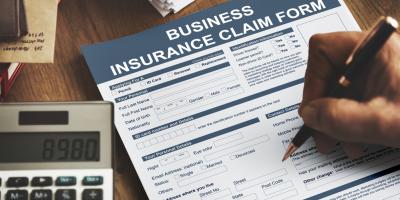
It’s tough to face a situation that sets back your business. Imagine if:
- An electrical fire damages your offices, equipment or inventory—and temporarily shuts down your business.
- A burglary results in stolen merchandise or specialized equipment.
- A customer is injured on your business property.
- You are denied access to your property due to a hurricane, wildfire, flood or other catastrophe.
Fortunately, if you’re adequately insured, you can recover from these events and keep your business operating. Once you’ve responded to any immediate onsite emergency, follow the steps below to file your claim so you can get your business back on track quickly.
- Contact Your Insurance Professional and Insurer as Soon as Possible—Your insurer or insurance professional will provide assistance with responding to your loss and filing your claim. If damage is extensive, your insurer may send an adjuster to inspect the property.
- Contact the Police if Necessary—If your business loss is due to a crime, you’ll want to contact the police and obtain a copy of the police report.
- Review Your Insurance Policy—Your policy may specify steps that you need to take when an insurable loss occurs.
- Prepare an Inventory—To substantiate your loss, prepare an inventory of damaged or destroyed items and give a copy to your insurance company and/or adjuster along with copies of any receipts.
- Provide Proof of Loss—You’ll be asked to send a signed, sworn proof of loss containing the information requested to investigate the claim. This must be done within 60 days after the initial insurer request.
- Be Ready for the Adjuster—If your insurer sends an adjuster, be prepared to have him or her inspect the property and examine books and records.
- Document Damage to Your Property—Identify damage to your building and other structures and make a list of everything you want to show the adjuster, for example, cracks in the walls or missing roof tiles. You may want to consider taking photos or video of the damage.
- Make Temporary Repairs if Needed—Take reasonable steps to protect your property from further damage—provided the area is safe to access. For instance, if your roof is damaged, placing a tarp over the exposed area will provide a short-term patch to prevent further wind or water losses. If immediate repairs to equipment are necessary, save the damaged parts in case the claims adjuster is interested in examining them. Save receipts for what you spend so you can submit them to your insurance company for reimbursement—and remember that payments for temporary repairs are part of the total settlement.
- Get at Least Two Bids for Repairs—Repairs or replacements should be bid competitively in order to provide options and hold down costs.
- Stay Organized—Keep copies of all the documents you submit to your insurance company, as well as any paperwork your insurance company provides you. And record the names and phone numbers of everyone you are in contact with during the claims filing process.
Additional Steps for Business Income and Extra Expense Claims
If your business is forced to close temporarily or relocate, you will want to file a business income and extra expense claim, if you carry this type of coverage. To receive a business income settlement, you must be able to show your business’s net income and continuing normal operating expenses incurred, including payroll, both before and after the event that disrupted your business. Your insurer may also look at your financial records over several years to determine income. In addition to locating and organizing records from before the event, keep detailed records of:
- Ongoing business activity and transactions, if any, while you recover from the event.
- Expenses associated with operating in a temporary location.
- Ongoing expenses that you must pay even if your business is closed, such as utility or advertising costs.
Filing Civil Authority Claims
If government action—e.g., closure of an area for inspection following a hurricane—prevents you from accessing your company’s premises and running your business, you can receive insurance reimbursement for expenses and lost business income, provided you have appropriate coverage. Your Business Owners Policy (BOP) or Commercial Package Policy (CPP) may include coverage for this type of business interruption.
Civil authority coverage for business income usually begins 72 hours after government action first prohibits access to your premises; this coverage then lasts for up to four weeks. Coverage for related expenses will start immediately when civil action is taken and generally lasts up to four weeks.
Civil authority coverage is triggered only if all of the following elements are met:
- Government authority prohibits access to the insured property.
- The prohibition is issued as a result of physical loss or damage caused to property within a one-mile radius of the insured property.
- The time element deductible (“waiting period”) is met.
Troubleshooting an Inadequate Settlement
If you’re unhappy with the handling of your claim or the amount of the settlement, take the following steps to try to win an adjustment:
- Talk to your insurance professional or claims manager to explain your point of view.
- Contact the claims manager at your insurance company and share your story and why you think you deserve a larger settlement. Provide a written explanation of your problem with copies of supporting documentation.
- Contact your state department of insurance about your problem.
